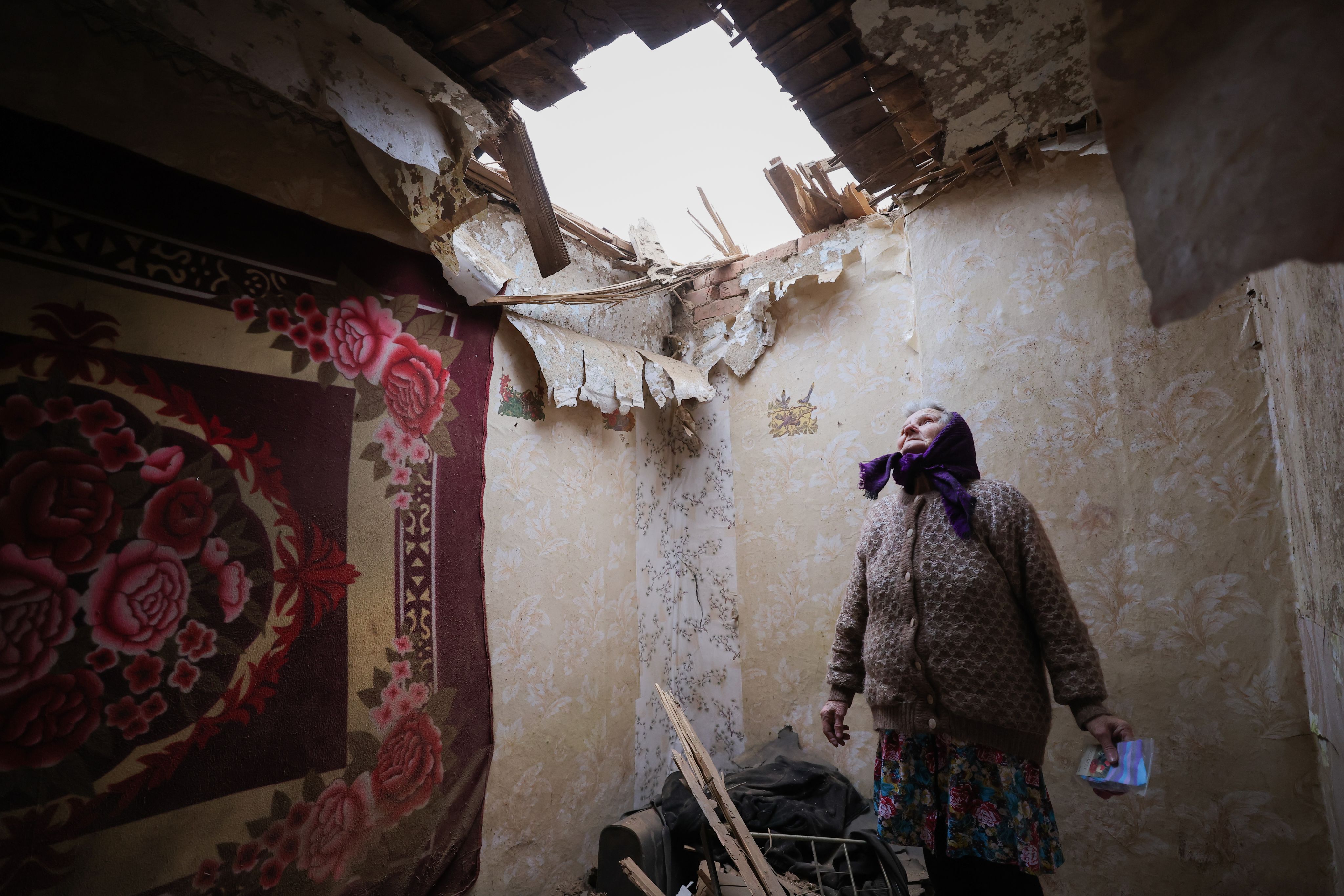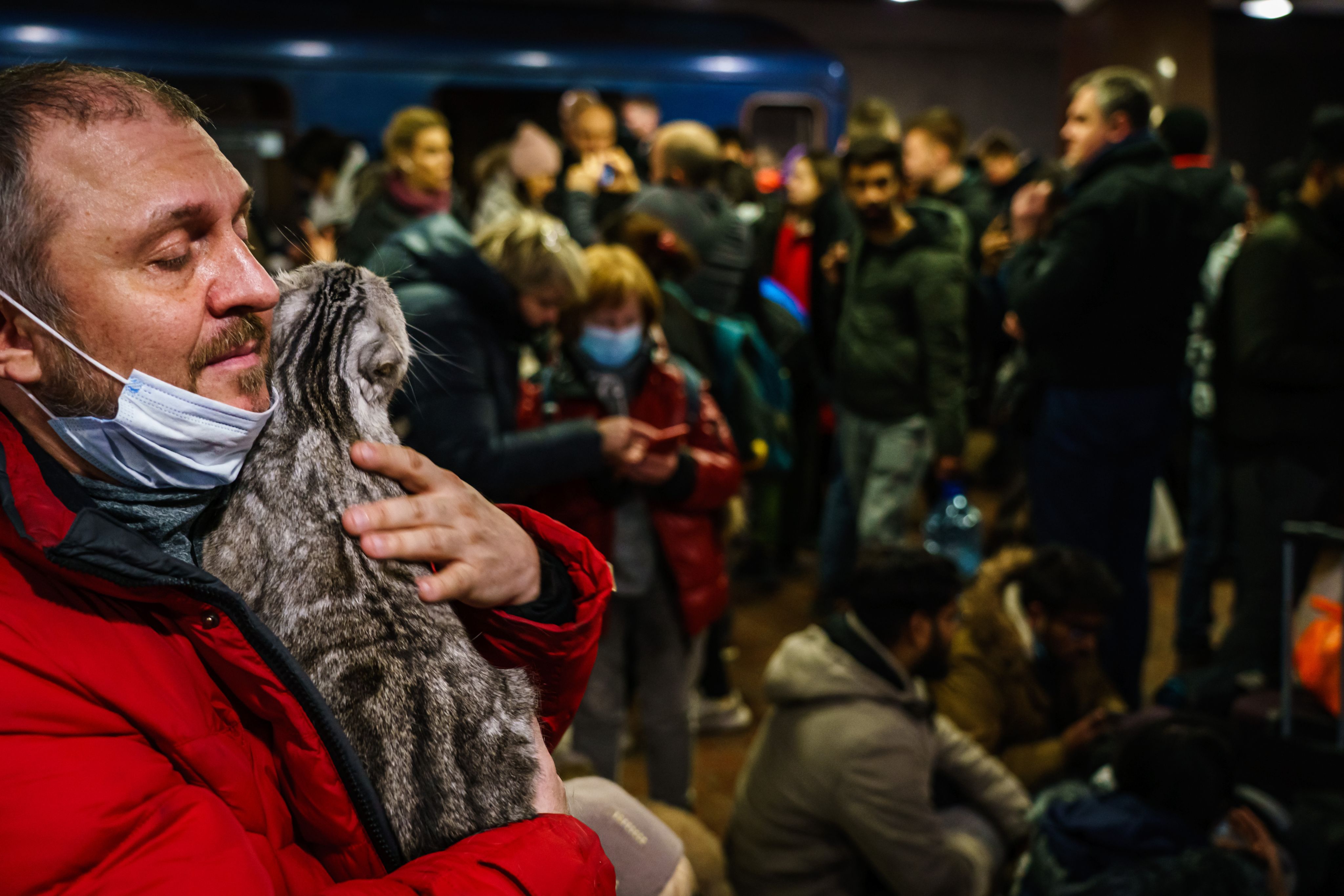Ukrainians under fire

Capital under attack
It was the sound of an explosion that woke Alyona Tkachenko and her family on Friday morning. Missiles were raining down close to their home in Ukraine’s capital Kyiv.
“A nearby house caught fire, and there were many victims,” she told Reuters news agency.
After the air raid siren ended, the 36-year-old fled with her children and parents to a shelter on the other side of the Dnieper River.

The city came under a sustained barrage of airstrikes as Russian forces entered from the north and east on Friday.

Windows have been blown out of apartment blocks and craters have formed in the streets. Damaged buildings and military debris can be seen across the capital.

Anatoliy Marchenko, who was surveying the damage to his Kyiv apartment balcony, said he was ashamed to speak Russian. The 57-year-old had previously served in the Soviet army.
"I know people there, they are my friends," he said of Russia. "What do they need from me? A war has come to my house and that’s it."
Residents sheltered in underground railway stations, while others took up arms to fight the advancing Russians.
The Ukrainian authorities have called for civilian recruits and for locals to make fire bombs as part of the fight back. Some 18,000 guns have been given to volunteers.
But thousands have fled the capital since the invasion began on Thursday.
Iryna, 36, left for Slovakia with her mother and two young daughters, leaving her husband behind to “support the government”.
"We pray for Ukraine and I hope everything will be fine,” she told Reuters news agency.
A country left in shock
Explosions and gunfire rocked major cities across the country as the Russians advanced. Dozens have been reported killed.
Russian troops moved across Ukraine’s borders from the north, east and south.

Olena Kurilo was among 20 wounded after an explosion in the eastern town of Chuhuiv.
“I never thought such a thing could happen,” the 52-year-old teacher said, her head bandaged.

As in other cities, people in the area have been taking shelter inside train carriages at subway stations.
Still, large numbers of civilians are on the move.

Tens of thousands have already left their homes, and the UN refugee agency, the UNHCR, says four million people may try to leave the country “if the situation escalates further”.
In neighbouring Poland, dozens of people, including children, have taken refuge at a train station in the town of Przemysl, just a few kilometres from the Ukrainian border.

"I come from Kyiv. I heard the explosions next to my building, and I quickly packed. I took almost everything with me," Olha, a polytechnic teacher, told the AFP news agency.
"I feel safe here but I cannot really help my relatives and friends. Many of them are in danger and cannot leave as quickly.”

“Anyone who can is fleeing," said Krisztian Szavla, one of the first refugees to arrive in Hungary on Thursday from Ukraine's western region of Transcarpathia - home to a large Hungarian minority.
"We don't want to go through what those over the mountains in the east are experiencing, waking up to sirens and the Russians bombing your city," the 28-year-old told AFP news agency on the Hungarian side of the border.
"I feel safe here but I cannot really help my relatives and friends. Many of them are in danger and cannot leave as quickly.”

People take to the streets
People in Russia and across the world have been protesting against the invasion.
Russian authorities arrested about 1,800 protesters and broke up demonstrations in more than 50 cities on Thursday - a move condemned by the UN.
In Ukraine, one woman launched her own solitary protest, confronting heavily-armed Russian soldiers in the southern port city of Henichesk.
“Take these seeds, so that sunflowers grow when you die here,” she told them.
On Friday afternoon, mostly women and children continued to escape across Ukraine’s western borders.
Men of military age have been told to stay and fight.

Photo credits: Getty Images, Reuters, EPA
Published: February 2022